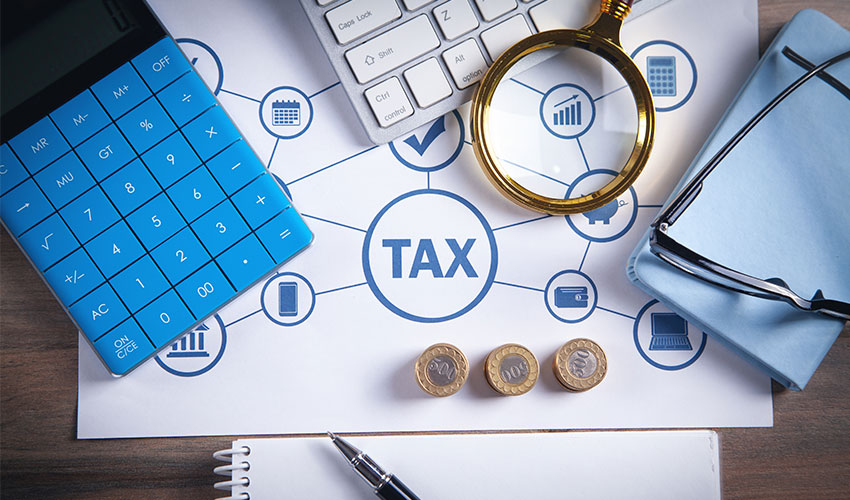Subscribe
Subscribe to EduBridge Blogs
What is Presumptive Taxation?
Presumptive taxation is a simplified method of calculating taxes for small businesses or individuals. Instead of detailed accounting, it assumes a predetermined income based on factors like turnover or industry norms. This approach reduces administrative burdens and promotes tax compliance among less complex entities.

What is Presumptive Taxation Scheme
The Presumptive Taxation Scheme, instituted under the Income Tax Act of 1961, serves as a pragmatic solution aimed at alleviating the burdensome obligation for modest taxpayers to meticulously uphold detailed financial records and undergo the intricacies of audit procedures. Conventionally, individuals deriving income from businesses or professions engage in the meticulous upkeep of financial records, culminating in the preparation of comprehensive balance sheets to gain insights into their financial standing across the fiscal year.
The scheme extends to individuals, Hindu Undivided Families (HUFs), and partnerships, offering them the option to disclose income at predetermined rates. This obviates the need for arduous bookkeeping and the mandatory audit process. The Income Tax Act provides for several avenues within the presumptive taxation framework, notably:
- Section 44AD: Tailored for small-scale businesses.
- Section 44ADA: Catering to professionals.
- Section 44AE: Specifically tailored for enterprises engaged in plying, hiring or leasing goods and carriages.
Presumptive Taxation Scheme for Business
The purpose of this scheme is to provide relief to small business taxpayers by relieving them of the requirement to maintain extensive accounting records. However, it’s important to note that the scheme does not cover businesses involved in the operation, hiring, or leasing of goods carriages as specified in section 44AE. Further, the Income Tax Provisions for maintaining books of accounts under Section 44AA and Audit in Section 44AB will not apply. Presumptive taxation under section 44AD can be utilized by the assesses mentioned below:
This scheme aims to provide a simplified accounting approach for small business owners, excluding those involved in goods carriage services as defined in section 44AE. Additionally, the usual Income Tax requirements outlined in Section 44AA for maintaining records and Section 44AB for audits will not be applicable. The following individuals are eligible to benefit from the Presumptive Taxation provisions under section 44AD:
- Resident Individuals
- Hindu Undivided Families (HUFs)
- Partnership Firms (excluding those classified as Limited Liability Partnership Firms)
- The advantage of this scheme is not accessible to Non-Resident Indians (NRIs). Also, a person who has made any deduction claims under sections 10A, 10AA, 10B, 10BA, or under sections 80HH to 80RRB in the pertinent year is disqualified from accessing the benefits of this scheme.
Presumptive Taxation Scheme for Professions
In the past, the presumptive taxation scheme excluded professionals. However, the 2016 budget witnessed an expansion as this scheme was extended to encompass professionals as well. Thus, professionals now have the option to embrace presumptive taxation under section 44ADA, beginning from FY 2016-17.
Professionals engaged in specified fields, with gross receipts not exceeding INR 50 lakhs, are eligible to select the Presumptive Taxation under Section 44ADA. This choice liberates them from the obligation of meticulous bookkeeping and spares them from undergoing a tax audit by the requisites of Section 44AB.
Presumptive Taxation Scheme Under Section 44AE
Section 44AE is formulated to provide assistance to modest taxpayers involved in the enterprise of operating, renting, or leasing goods carriages.
Eligible Business as per Section 44AE
- A person who is involved in the operation, rental, or leasing of goods carriages, possessing no more than 10 such vehicles at any point during the year, is covered by the regulations of section 44AE. This includes carriages acquired through hire purchase or installments.
- The regulations outlined in section 44AE are relevant to all entities, encompassing individuals, Hindu Undivided Families (HUFs), partnerships, companies, and others.
Characteristics of the Scheme u/s 44AE
- The obligation to uphold financial records according to section 44AA is waived for the taxpayer.
- The business’s total revenue must remain below INR 2 Crore (previously INR 1 Crore up to FY 2015-16).
- Earnings from a substantial goods vehicle are set at INR 7,500 monthly for each vehicle.
- A taxpayer is ineligible to assert business expenditures against their earnings.
- A taxpayer must submit Form ITR 4 via the Income Tax Website.
Round up a portion of a month to the subsequent month. For instance, if the ownership of a goods carriage spans 7 months and 5 days, the computation of net income will consider it as if the carriage was owned for 8 months.
What are The Benefits of Presumptive Taxation
- Contribution to the Central Government’s National Defence Fund.
- Support for the Prime Minister’s National Relief Fund.
- Under Section 44AD presumptive taxation, your taxable income is set at 8% of your turnover, subject to taxation.
- If your receipts are non-cash (digital), only 6% of these receipts are considered taxable income, attracting tax.
- Elimination of the requirement to maintain detailed accounting records.
- Exemption from the obligation to undergo accounting record audits.
- Streamlined advance tax payment: Instead of quarterly estimations, you can settle all your advance tax by March 31. For presumptive scheme participants, advance tax payment should be made by March 15 of the relevant fiscal year if your projected tax liability exceeds ₹ 10,000 for the year.
Conclusion
In conclusion, Presumptive Taxation serves as a valuable tool for simplifying tax calculations and reducing administrative complexities, particularly for small businesses and individuals. Offering an alternative to intricate accounting procedures fosters greater tax compliance and allows taxpayers to focus on their core activities. As with any tax scheme, a clear understanding is essential for optimal utilization. Stay informed and make informed financial decisions. To delve deeper into taxation concepts and enhance your accounting knowledge, consider enrolling in an accounting and taxation course with EduBridge.
Recent Blogs
Related Blogs
Accelerate Your Career with Expert Guidance and Guaranteed Job*!
"*" indicates required fields



